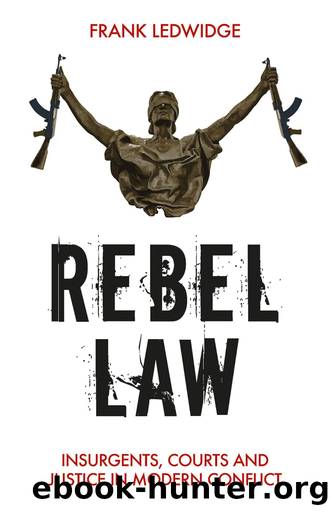Rebel Law : Insurgents, Courts and Justice in Modern Conflict (9781849049238) by Ledwidge Frank

Author:Ledwidge, Frank [Ledwidge, Frank]
Language: eng
Format: epub
ISBN: 9781849047982
Publisher: Oxford Univ Pr
Published: 2017-11-15T00:00:00+00:00
The challenge of pluralism
The perceived problem of having more than one legal or dispute resolution system in the same area, and perhaps one far removed in nature from the state system, is known as âlegal pluralismâ. We briefly touched upon it in Chapter 1. Some theorists regarded âlegal centralismââthe idea that one, usually state law, âis and should be the law of the state, uniform for all persons exclusive of all other law and administered by a single set of state institutionsââas a counterpoint to pluralism.16 Others see legal centralism as âa myth, an ideal, a claim, an illusion.â17 As discussed in Chapter 1, the fact is that there are multiple sources of dispute resolution in all societies.
There is a vast amount of literature on the topic of legal pluralism, which is essentially considered to be a discrete field of the anthropology of law. However, it is only in the last decade that attention has been directed at its role in conflict and post-conflict situations. Yet while the term and the academic discourse are relatively recent, the study and practice of rule in pluralist society can be identified as far back as 1772. In that year, a regulation of the East India Company provided: âIn all suits regarding inheritance, marriage, caste and other religious usages and institutions, the laws of the Koran with respect to the mohamedans [sic] [etc.] shall be adhered to.â18
During the imperial period in India, from roughly the 1750s to the 1940s, in order to retain a modicum of order in colonial territories with apparently multiple sources of legal power, there was an awareness of the need to ensure that conflict was kept to a minimum. For over a century, there was extensive discourse and writing on how colonial administrators should deal with the challenges of what is now called âcustomary lawâ.
In the colonial era, the imperial powers sought to maintain effective rule (or rule that was effective enough to maintain authority) over huge areas through the use of a small number of administrators with minimum effort in terms of the imposition of âformalâ judicial (or indeed other) governmental functions. Many of the lessons identified by such regimes as the British, French and Ottoman Empires have been forgotten in recent counterinsurgency campaigns, which have focused more on formal structures, at the expense of more effective âlight touchâ informal provision. We will see the effects of this in Chapter 8.
The essence of the technique became known as âindirect ruleâ, which
came to require that indigenous law [what might now be called âcustomary lawâ] be discovered, written down and made available for implementation. The assumption was that ânative lawâ could be recorded as a set of rules about how social life should be ordered and then applied by magistrates in the settlement of disputes.19
This technique was used in almost all the areas of Africa and Asia governed by the British and the French.
The key work on âindirect ruleâ, written in the early twentieth century, was Frederick Lugardâs Dual Mandate.20 This
Download
This site does not store any files on its server. We only index and link to content provided by other sites. Please contact the content providers to delete copyright contents if any and email us, we'll remove relevant links or contents immediately.
Killers of the Flower Moon by David Grann(3240)
Machine Learning at Scale with H2O by Gregory Keys | David Whiting(2292)
Will by Will Smith(2043)
Guns, Germs and Steel by Diamond Jared(1884)
Borders by unknow(1785)
The Room Where It Happened by John Bolton;(1721)
The Color of Law by Richard Rothstein(1575)
Once Upon a Broken Heart by Stephanie Garber(1485)
Water Rights and the Environment in the United States by John Burch(1414)
Friends, Lovers, and the Big Terrible Thing by Matthew Perry(1328)
Examples & Explanations: Administrative Law by William F. Funk & Richard H. Seamon(1326)
A Short History of War by Jeremy Black(1300)
HBR's 10 Must Reads 2022 by Harvard Business Review(1256)
Pharmacy Practice and The Law by Richard Abood(1254)
The Strength In Our Scars by Bianca Sparacino(1248)
That Every Man Be Armed by Stephen P. Halbrook(1237)
The Guarded Gate by Daniel Okrent(1220)
515945210 by Unknown(1208)
Injustices by Ian Millhiser(1199)
